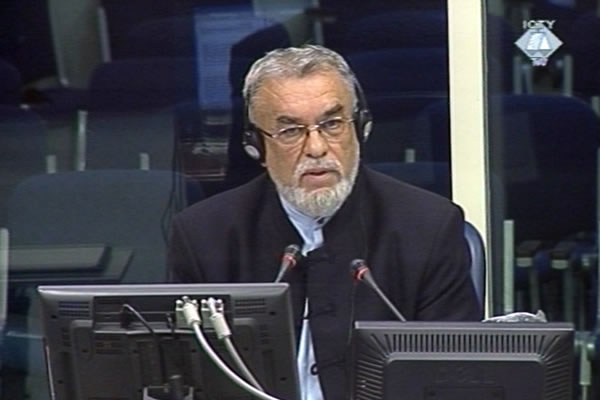Home
PSYCHIATRIST BLAMES CRIMES ON PSYCHOPATHS
Goran Dodig, psychiatrist from Split, contends that Croatian generals Gotovina, Cermak and Markac are not guilty of the crimes during and after Operation Storm. According to Dodig, crimes were committed by psychopaths who make 10 to 15 percent of the population in every society
 Goran Dodig, svjedok odbrane Ivana Čermaka
Goran Dodig, svjedok odbrane Ivana Čermaka It was only in the cross-examination of Goran Dodig, a psychiatrist from Split, that it became clear that in August and September 1995 he had briefly visited Knin several times as a representative of the Croatian government. Dodig, who is testifying as Ivan Cermak’s defense witness, met the accused general there several times. Yesterday the statement Dodig gave to the defense was admitted into evidence. In the statement and in his evidence today, Dodig said he knew there had been crimes, but denied the existence of the joint criminal enterprise aimed at expelling Serbs from Krajina. Generals Gotovina, Cermak and Markac are charged with participation in this joint criminal enterprise.
Although Dodig admits that nobody from the Croatian leadership consulted him on any issues during the preparations for Operation Storm, he is sure that the objective of the attack on Krajina was not to expel Serbs but to reintegrate that territory into Croatia. The witness emphasized that, as far as he knew, President Tudjman had ‘a reasonable and normal attitude’ towards Serbs, seeing them as citizens of the state he headed who were to be given even more rights than other citizens.
During his visits to Knin, Dodig didn’t learn anything about the crimes against Serbs and their property, assuming that General Cermak didn’t know about them either. Only later did he hear that there had been crimes against Serbs, the witness said. According to Dodig, the three generals on trial in The Hague are not responsible for those crimes; the psychopaths who make 10 to 15 percent of the population in every society are to blame.
In an effort to discredit the witness, the prosecution showed an article from 2001 in which Dodig called the Tribunal in The Hague ‘a political tribunal without any moral strength’. The witness replied, ‘people change’, and that today he might not say the same thing, urging the judges to understand his ‘emotional attitude towards the institution’ which is trying persons who, in his opinion, are honorable men, not guilty of the crimes in Operation Storm. ‘If I knew that any of those men contributed to the crimes they have been charged with, I could not live in Croatia any more. ‘For me, the trial of the Croatian generals in The Hague is as if I myself were in the dock’, Dr. Dodig concluded.
In his re-examination, defense counsel Kehoe tried to prove that the witness was not the only one who thought the Tribunal was ‘a political court’: some former ICTY employees shared this view. Kehoe showed segments from the book Peace and Punishment authored by former OTP spokesperson Florence Hartmann where she qualifies the Tribunal’s work in similar terms. When the presiding judge joined in the debate, it became clear that the witness labeled the Tribunal a political court because the prosecution failed to identify the real culprits for the crimes in Krajina, but convicted unjustly ‘the symbols of the Homeland War’. Hartmann, on the other hand, called the Tribunal a political court because of the purported attempts on the part of foreign governments to influence its work.
Linked Reports
- Case : Gotovina et al. - "Operation Storm"
- 2009-10-06 CERMAK ‘WAS CONFUSED’ ABOUT HIS POWERS
- 2009-10-05 CERMAK ‘MIXED UP INFORMATION’ ABOUT THE GRUBORI CRIME
- 2009-10-01 GENERAL WITH CIVILIAN POWERS
- 2009-10-08 ‘PLANNED CRIMES’ BECAME ‘ISOLATED INCIDENTS’
- 2009-10-09 USTASHA SONGS OR PATRIOTIC SONGS?
- 2009-10-12 WHERE THERE USED TO BE 90 PERCENT SERBS, NOW THERE WERE 90 PERCENT CROATS
